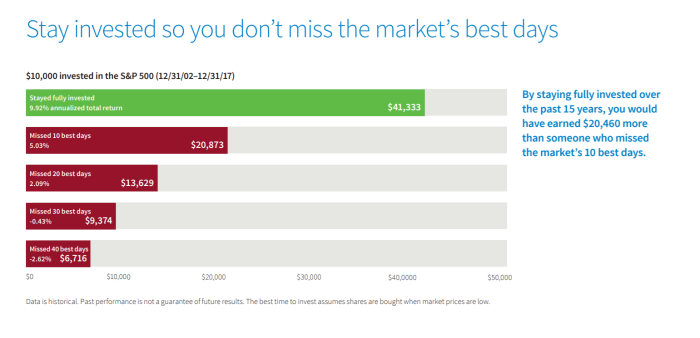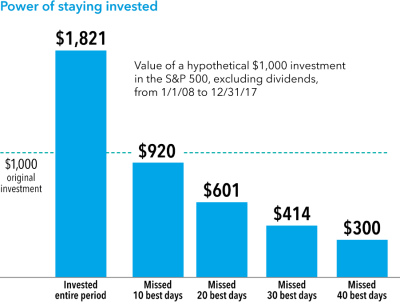There are differing rates of returns earned by investors dependent upon their level of commitment to a long-term investment plan. It comes down to time in the market not timing the market. A good picture of what we are talking about can be found in the following example1. The time period in the following example is 12/31/2002 to 12/31/2017, and the amount assumed invested at the beginning is $10,000.

- Staying invested in the market earned an investor an annualized total return of 9.52%. This translates into $10,000 growing to $41,333.
- Staying invested but missing the 10 best days in the market earned an investor an annualized total return of 5.03%. This translates into $10,000 growing to $20,873.
- And finally, by staying invested but missing the 20 best days in the market, earned an investor an annualized total return of 2.09%. This translates into $10,000 growing to $13,629.
Why does this happen? And how can it be addressed in a way that instills confidence and commitment with your investment plan?
- As we discussed in our last blog, The Cost of Not Having an Advisor, it is more often than not an individual's emotions, psychology, and desire to out-maneuver the market that leads to diminished returns. Avoid as much as possible trading on the news or events that can be perceived as volatile. This phenomenon is called “selling on the news” and can cause an investor to miss upturns in the market.
- Keep your emotions in check and remember why you invested in the market in the first place. You have goals that you wish to achieve such as, successful retirement, planned travel, new purchase, gifting, etc. Everyone’s goals are different but it is important to remember what drives your investing when you become impatient with the market. As financial advisors we are here to remind you of those goals, feel free to contact us and get our opinion.
At Kashani financial services we work with our clients to remind them of investor behavior and to accommodate a portfolio that fits an investor's tolerance for risk and volatility. We are here to work through the investor behavior so that our clients stay invested and do not miss the best days of the market. Your success is our goal.
Sources:
- https://www.putnam.com/literature/pdf/II508.pdf 1
- https://www.americanfunds.com/individual/planning/investing-fundamentals/time-not-timing-is-what-matters.html#top 2
For Reference:
1
 2
2
All indices are unmanaged and investors cannot actually invest directly into an index. Unlike investments, indices do not incur management fees, charges, or expenses. Past performance does not guarantee future results.